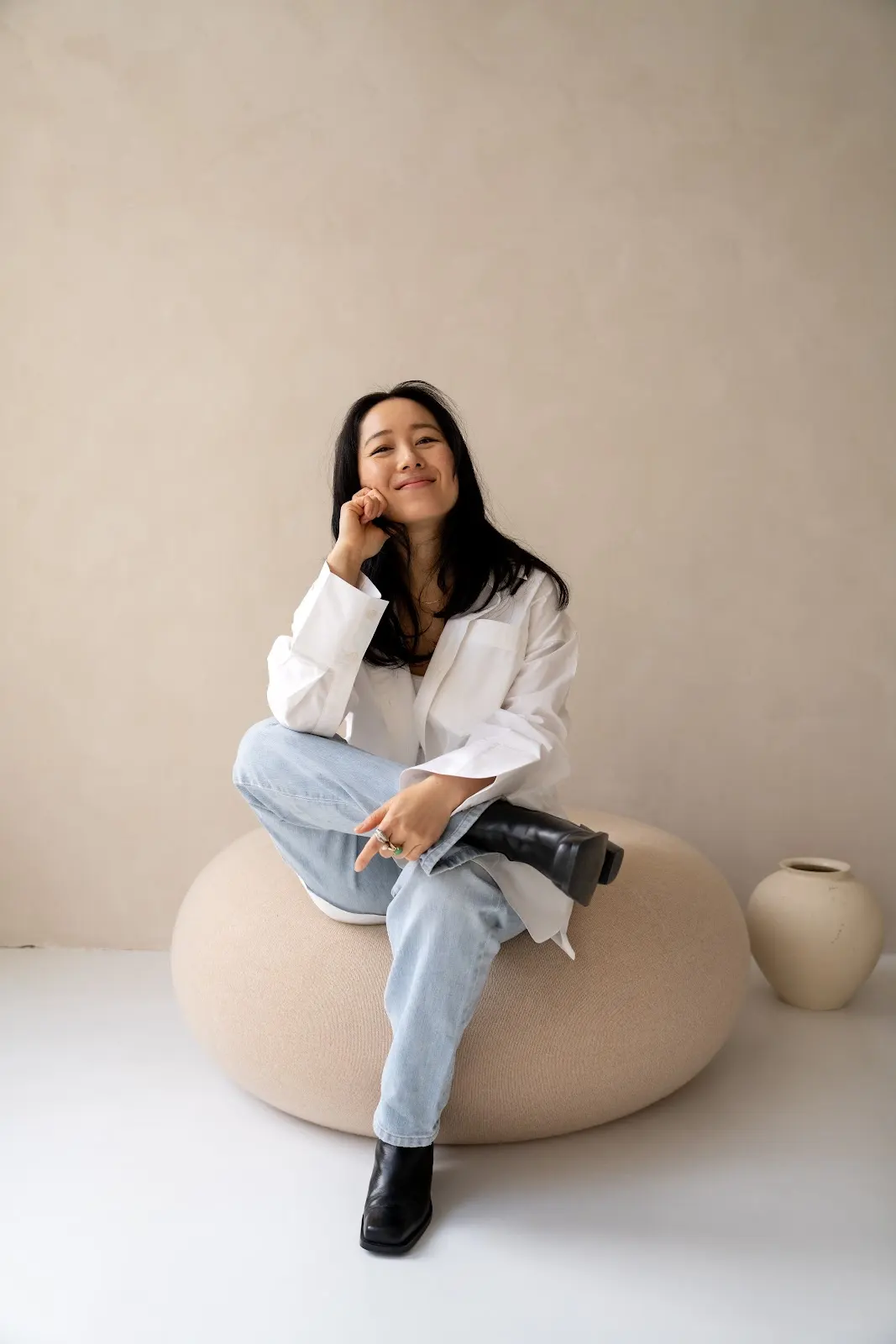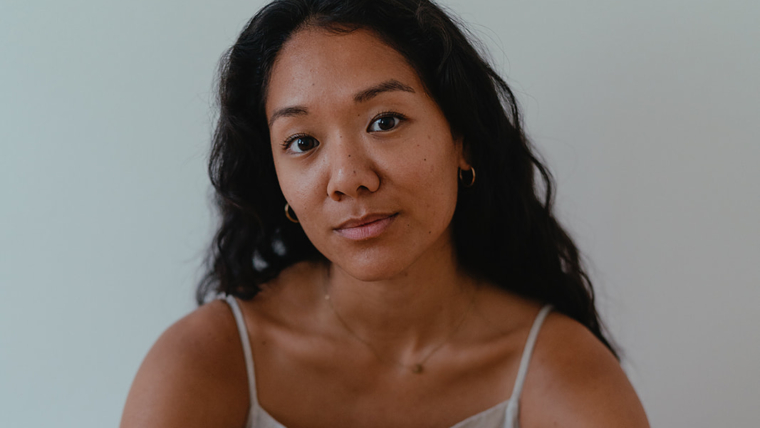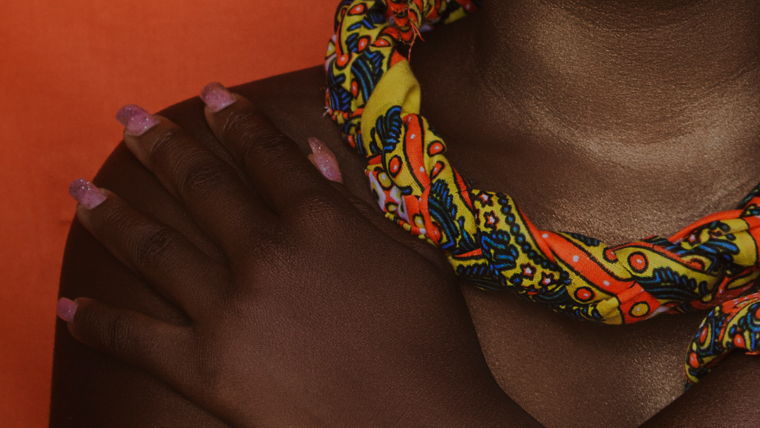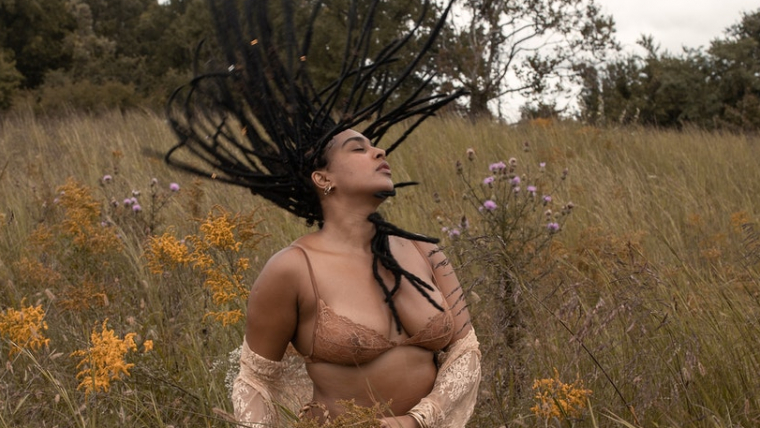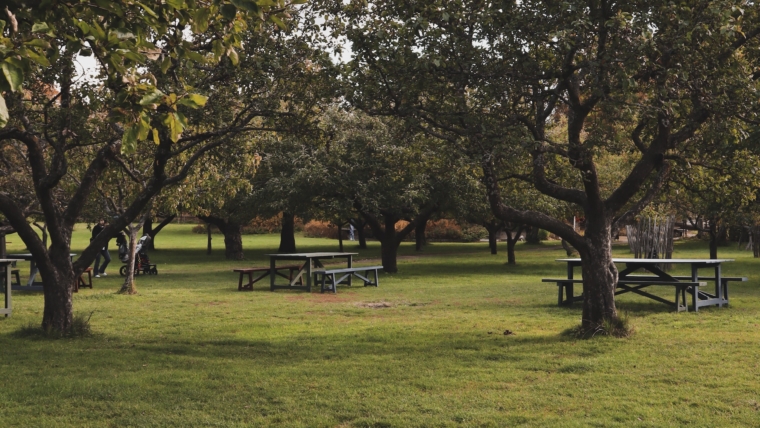Thien-Kim Tran – Acupuncturist, passionate foodie, and advocate for holistic health – blending traditional Chinese Medicine and psychology in her practice – inspiring slow living through mindful self-care and inclusivity in complementary healthcare.
Welcome to another edition of Adjuma Slow Talks, a series of in-depth interviews where we explore the concept of slow living through the experiences and insights of various individuals. In each conversation, we sit down with people who, through their profession or lifestyle, are embracing a slower, more intentional way of life. Today, we’re thrilled to introduce Thien-Kim Tran, an acupuncturist with a passion for holistic health, mindful living, and food. Kim takes us through her journey with Traditional Chinese Medicine (TCM), her slow living practices, and how she incorporates these into her daily life and work.
“Most people call me Kim, but I like my full name, because it was chosen by my parents and it means heaven/sky and gold/metal.“
– Thien-Kim Tran
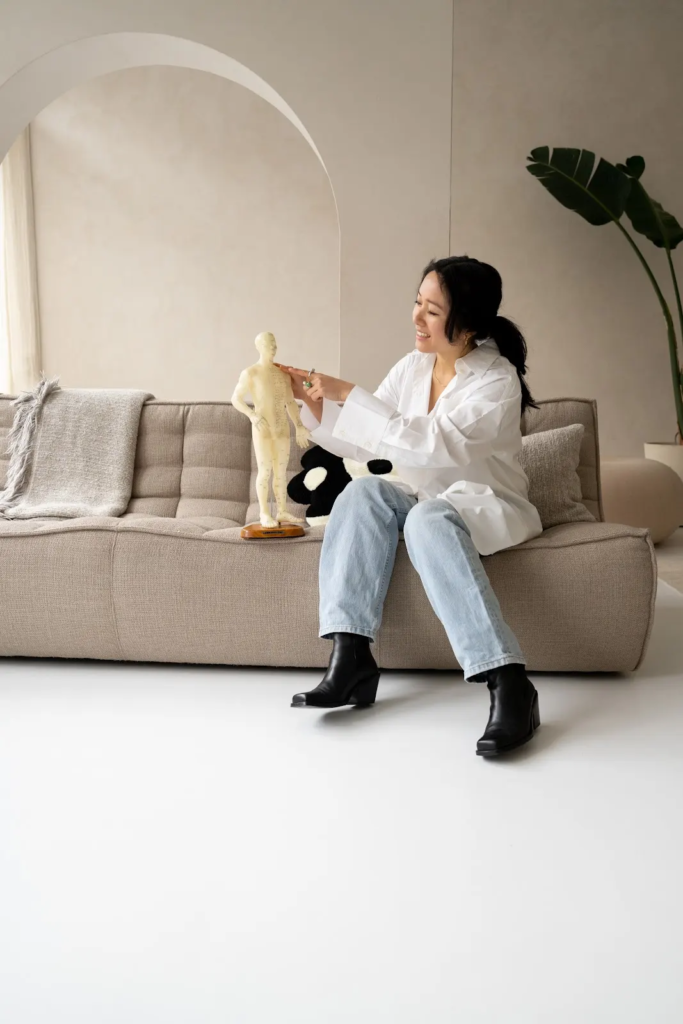
Can you introduce yourself? Tell us your name, where you live, who you are, what you enjoy, and what makes you happy.
Hi! My name is Thien-Kim Tran or Kim. Most people call me Kim, but I like my full name, because it was chosen by my parents and it means heaven/sky and gold/metal. I’m an acupuncturist and mom of Juno, besides that I’m a foodie. I love my work as an acupuncturist. Helping people on their journey to a balanced and healthy life is amazing. Some of my clients came in when they were in a difficult stage in life and today they come back to show me they’ve been featured in magazines or newspapers. It gives me so much joy to see them grow. My goal is to show people that they deserve a healthy and happy life and i’ll be happy to guide them with very easy tools to help them on that journey.
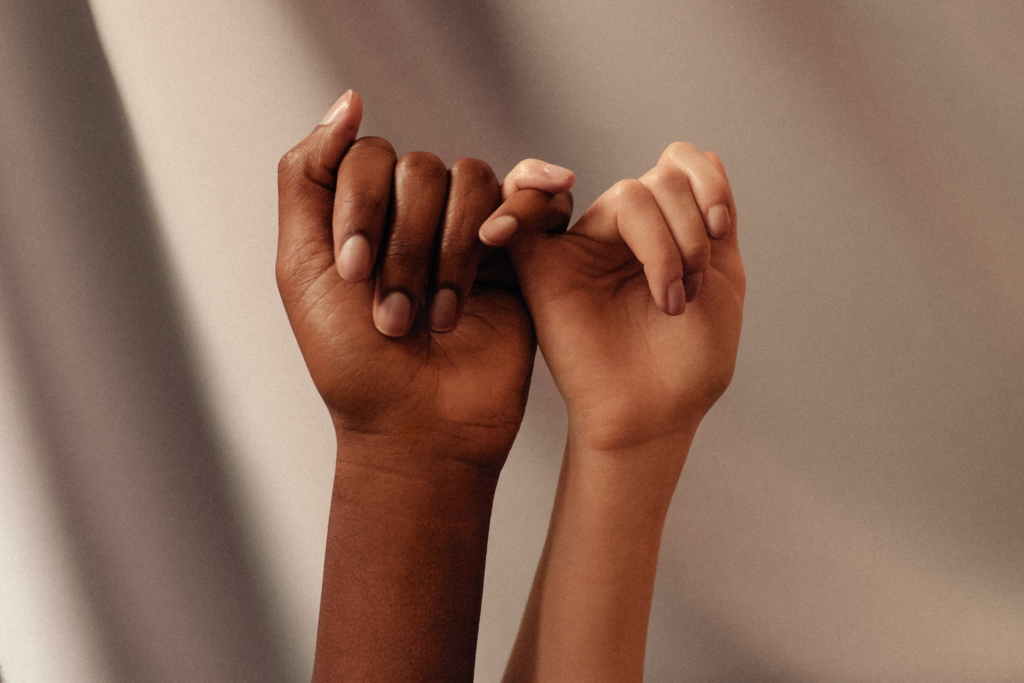
“My days are usually all over the place, except on Sunday. “
– Thien-Kim Tran
What does a typical (slow living) day look like for you?
My days are usually all over the place, except on Sunday. Sunday is my favorite day and it starts with cosy family mornings in pyama’s with lots of cuddles and laughs, then we cook breakfast and don’t pressure ourselves with plans. Sometimes we go see family or friends, and sometimes it’s just the three of us. In the night I am strict and when everyone is asleep I take the time to unwind with bit of stretching and a mindfulness meditation.
With your busy schedule having all these roles, how do you integrate the principles of slow living into your daily routine? Are there specific practices or rituals that help you maintain a sense of balance and mindfulness?
I think it’s about going away from the rush and fast life we are in. It takes time to practice it, but mindfulness is definitely a tool which can be a good tool for this. For instance on Sundays, having a less packed day, prioritizing rest and go for a walk instead of taking a fast transportation option.
“Actually my practice is an ode to my family and my late dad’s work, he was an acupuncturist. “
– Thien-Kim Tran
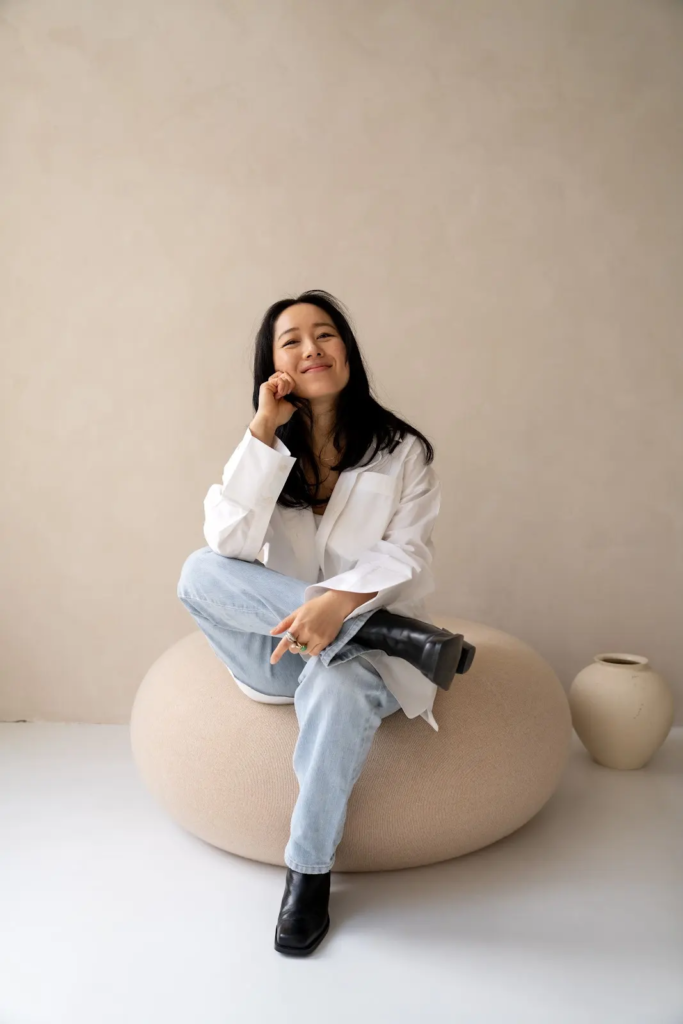
Can you tell us more about your practice?
I got my acupuncture license in 2020 and started to practice in a spare bedroom in my appartement. Since 2022 I opened a small practice in Amsterdam – close to central station. It’s a humble space, but I’m happy I’m not operating from my small bedroom in Bijlmer anymore. Actually practice is an ode to my family and my late dad’s work, he was an acupuncturist. In my practice I combine my background in psychology and integrate this with Eastern medicine approaches which result in a modern mix of acupuncture, mindfulness and meditation.
I actually got into acupuncture because of my parents. Growing up my parents have always been throwing heaps of TCM knowledge about on us. My grandparents and greatgrandparents were herbalist who used TCM to help their communities. When our dad said to me you should study TCM, at first I didn’t want to do it. Because being a migrant kid growing up in a small village, all I wanted to do is to fit in. So I decided to study Pharmaceutical Studies and then Psychology. I finished my masters in Psychology and was starting my career. But it didn’t prevent me from wanting to connect more with my family and roots. And so started to study acupuncture, to connect with my heritage and TCM and to learn about new ways to help people.
“Many of these self care and health practices don’t make us feel welcome, or we can’t identify with the people doing it.”
– Thien-Kim Tran

What are your main motivations for your practice? Why did you choose this path?
As a TCM therapist I find it most important to create awareness about (mental) health. And to help my patients gain knowledge about how easy TCM can help them. I see patients sometimes run into barriers that limit them to healthy activities and self care. With Acupuncture by Kim I aim to provide a space which is accessible, safe and inclusive to those from marginalized communities. In the (complementary) health industry today many places are still not that welcoming and respecting individual backgrounds and needs. My goal is to set an example for (complementary) health care. Everyone has the right to a healthy balanced life, it’s not a privilege.
What are the benefits of acupuncture? And what issues can we come to you for?
There’s a lot of benefits to acupuncture. And they are both for your physical and mental well-being, since it’s an holistic approach. It can help alleviate pain, reduce stress and anxiety, improve sleep quality, boost immune function, hormone function and enhance overall energy levels.
In my practice I see a wide range of health concerns. It really depends on the season, in the winter it’s more depression and other mental health related concerns. All seasons I have a lot of (work) stress and pain management related issues. But now it’s a lot of fertility support, hayfever, digestive disorders, sleep problems, and headaches.
“We won’t just treat for instance a burn out or headache by relieving the symptoms. But we look deeper to find out the root cause of them. “
– Thien-Kim Tran
You often talk about holistic health; can you tell us more about that?
TCM is a holistic approach, because it focuses on the interconnection and balance of the whole person – body, mind, and spirit and the environment and nature. The kind of holistic approach TCM has, has a lot of similarities with Taoism. In TCM All (mental) health concerns and problems are viewed as something which is is influenced by more than just a person’s body and organs.
We won’t just treat for instance a burn out or headache by relieving the symptoms. But we look deeper to find out the root cause of them. During a consultation I will be taking into account all aspects of a person’s life, including their diet, exercise, stress levels, relationships, and the environment they work or live in. Because we need to understand this disbalance in order to promote healing.
To what extent is slow living a part of your life, and perhaps also your work?
I got to know a form of slow living through Plum village – a buddhist monastery led by the teachings of ThayThich Nhat Hanh. Our dad sent us there 15 years ago to learn about mindfulness and meditation.
For me personally, slow living is about being mindful with everything, even what you say, do, eat and feel. In my personal life I try to take my actions slow and with intent where I can. In my work as acupuncturist I encourage my clients to slow down and combine acupuncture with mindfulness excercises. The clinical setting, which is calm and minimalistic, makes it easier for them to practice mindfulness and meditate. During my consultations the clients can also get personalised advises or plans to integrate traditional medicine and mindfulness with their lives.
Do you have any tips for our readers?
I’m a fan of mini mindfulness excercises. Throughout the days, try to do at least one thing in the morning and one thing in the evening with intent, one thing at a time and in a slower pace. That will make you more aware about what you are doing, and get you more into the present moment. For instance have your tea and don’t use your phone. Or walk during your lunch break without music in your ears. It doesnt take a lot of effort, but they will definitely help you.
Is there anything we haven’t asked you that you’d like to share?
There’s so much more to tell about acupuncture and TCM, but I think it’s the best to experience it yourself. In case you are curious and have specific questions, feel free to connect with me on IG and drop me a DM. Happy to talk all things TCM there!
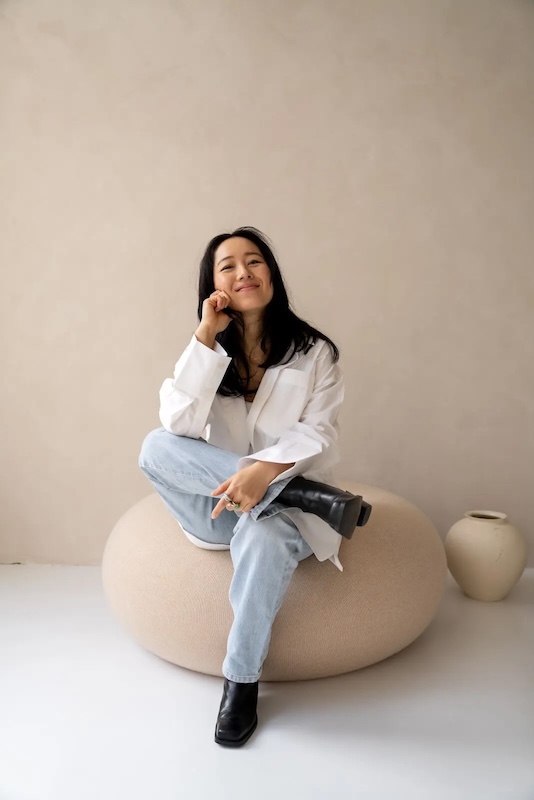
Thank you so much, Thien-Kim for sharing your beautiful and inspiring story with us! Your passion for acupuncture and your commitment to holistic health are truly motivating. For those of you reading, if you’re intrigued and want to know more about Thien-Kim and her practice, I wholeheartedly recommend checking it out. I had an acupuncture session myself, and it was an amazing experience, I can’t recommend it enough!
To learn more, visit her website at www.acupuncturebykim.nl and don’t forget to follow her on Instagram for insights and updates: @acupuncture.bykim.
Thank you for joining us in this conversation, and we hope you feel inspired to explore the benefits of acupuncture and TCM!
